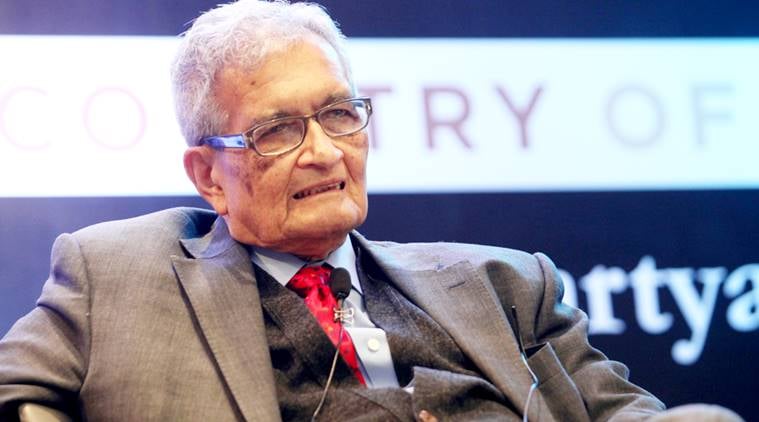 Referring to the Supreme Court’s observation on “mobocracy”, Sen said that “Dalits and minorities have become victims of organised killing” and the government has to take responsibility.
Referring to the Supreme Court’s observation on “mobocracy”, Sen said that “Dalits and minorities have become victims of organised killing” and the government has to take responsibility.
TAKING FORWARD his argument about India taking a quantum leap in the wrong direction, Nobel laureate Amartya Sen said on Thursday that “this leap is in the direction of exclusion”.
Referring to the Supreme Court’s observation on “mobocracy”, Sen said that “Dalits and minorities have become victims of organised killing” and the government has to take responsibility. “Mobocracy and despotism make people live in fear. It is a terrible thing to happen, whether or not it affects the economy. The central issue is that of liberty and democracy,” he said in a televised face-off with NITI Aayog Vice-Chairman Rajiv Kumar on NDTV 24×7.
At the launch of the Hindi edition of his book, An Uncertain Glory: India And Its Contradictions, this month, Sen had spoken about India’s quantum leap in the wrong direction since 2014. Kumar had later criticised the remark and said Sen should spend more time in India.
On Thursday, Kumar accused Sen of not doing India any good by “spreading this talk of living in fear… Because you are the one who is quoted.”
Sen responded with, “India is a great country. There are people in India who feel that government action is not adequate, that the government has not done enough to make minorities and Dalits to feel comfortable, then India will cease to be a great country.”
Besides pointing to recent incidents of lynching and mob violence, Sen defended his earlier statement by raising the increasing privatisation of healthcare and education. “India, unlike the rest of the world, has neglected primary healthcare and gone for private care in a way that no other country in the world has,” he said, adding that similar free market economy has come into play in the field of education.
He criticised the plan to disband the University Grants Commission as well as the decision to grant ‘Institute of Eminence’ status to Reliance Foundation’s proposed Jio Institute. Kumar defended the move by saying that the idea was to have a “start-up which could set the benchmark for others.”
“Never have we had the kind of macro stability we have today with growth and inclusion,” said Kumar, who flayed Sen’s critique of demonetisation by stating that anyone who speaks against demonetisation “is only speaking for the corrupt and the rich”.
Sen maintained that demonetisation was a despotic decision. “All studies indicate it had huge political benefit but it did great economic harm,” he said.